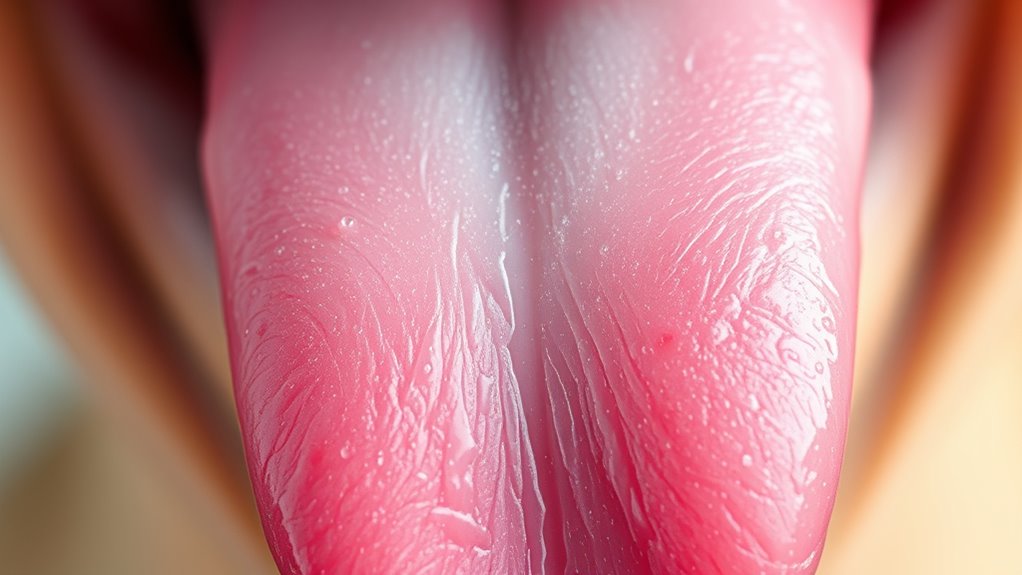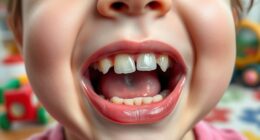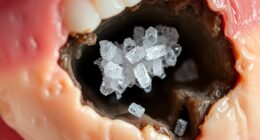Cleaning your tongue is essential for fresh breath and overall oral health. It helps remove bacteria, debris, and dead cells that settle on its surface, preventing bad odors and infections. Regular tongue cleaning with a scraper or brush reduces plaque buildup and supports taste perception. If you’re curious about the best methods or signs you need professional advice, continue exploring how consistent tongue hygiene can make a difference.
Key Takeaways
- Tongue cleaning removes bacteria and debris, reducing bad breath and preventing oral infections.
- Regular cleaning targets plaque buildup on the tongue surface, supporting overall oral hygiene.
- It enhances taste perception by clearing coating and improves confidence through fresher breath.
- Using a tongue scraper effectively removes biofilm, which is harder to eliminate with brushing alone.
- Consistent tongue cleaning complements brushing and flossing, contributing to healthier teeth and gums.
Why Cleaning Your Tongue Matters for Oral Health
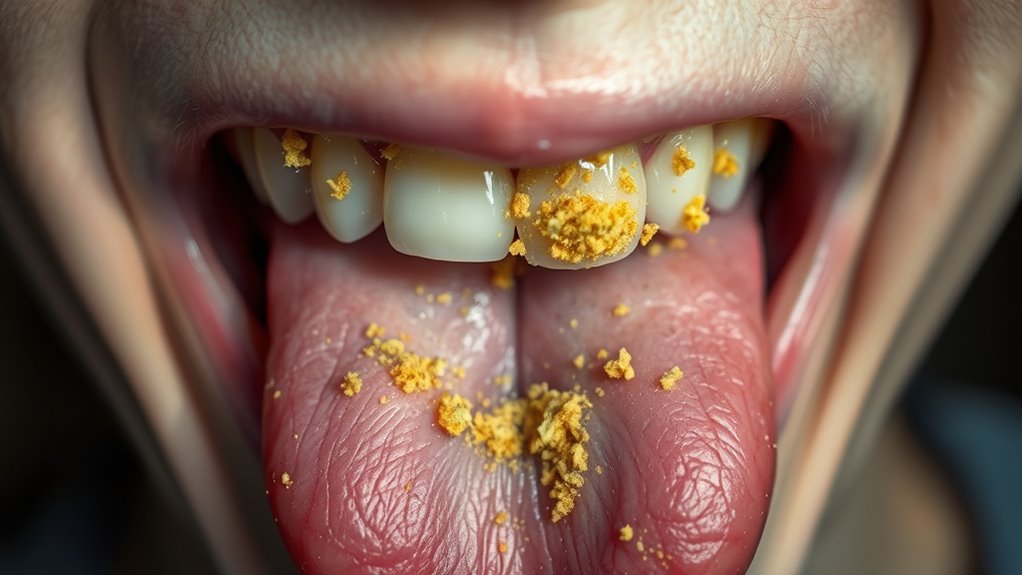
Cleaning your tongue is essential because it directly impacts your overall oral health. Regular tongue cleaning helps remove bacteria and debris that accumulate on its surface, especially in crevices and around taste buds. This buildup forms plaque, which can lead to bad breath and increase the risk of oral infections. Utilizing proper cleaning tools like a tongue scraper or gentle brushing effectively reduces bacterial load, supporting your oral hygiene routine. Since the tongue harbors about 50% of mouth bacteria, neglecting it can compromise your oral health and contribute to cavities and gum disease. Proper tongue cleaning also enhances taste perception and complements brushing and flossing. Incorporating antibacterial mouthwash into your routine can further help control bacterial growth on the tongue and in the mouth. Additionally, regular cleaning can prevent the formation of tartar and improve overall oral freshness. By maintaining a clean tongue, you promote fresher breath, prevent infections, and ensure your overall oral health stays in excellent condition.
How Bacteria Accumulate on the Tongue and Why It’s a Concern
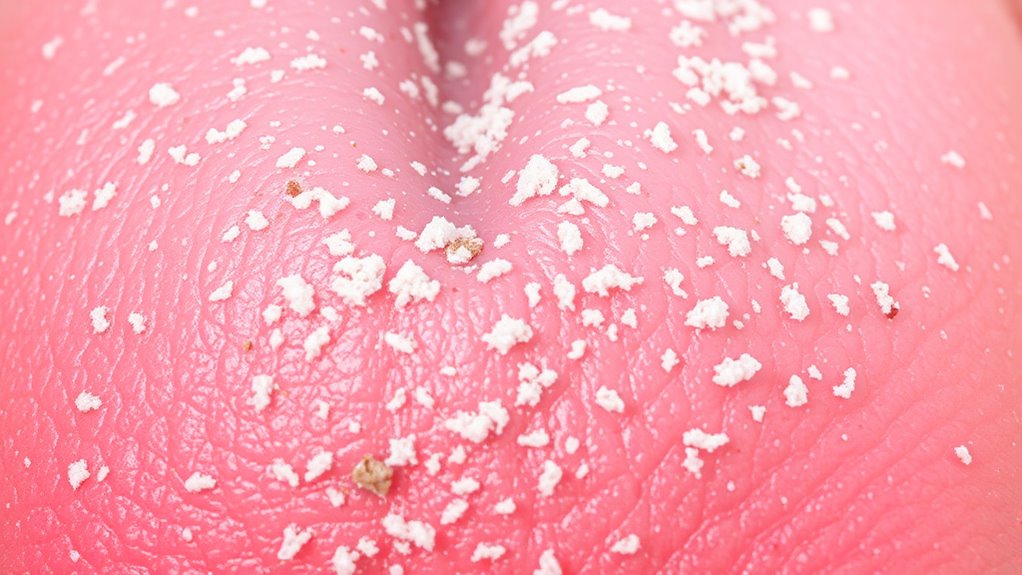
The surface of your tongue is a hotbed for bacteria, similar to those on your teeth, which can form a sticky biofilm that’s hard to remove. Bacteria tend to hide in crevices and between taste buds and tongue structures, making them difficult to eliminate. This bacteria buildup can discolor your tongue from substances like coffee and red wine, and contribute to bad breath. Regular tongue cleaning with a tongue scraper helps reduce oral bacteria and biofilm. Additionally, proper cleaning techniques can help maintain the color accuracy and overall health of your oral environment. Here’s why it matters: 1. Bacteria thrive in hard-to-reach areas, risking oral health if not cleaned. 2. Biofilm protects bacteria from removal, increasing buildup. 3. Eliminating bacteria improves taste, freshens breath, and enhances oral hygiene. Regular cleaning can also support the oral microbiome, which plays a crucial role in your overall oral health. Keeping your tongue clean is essential for preventing bacteria accumulation and supporting overall oral health. Proper cleaning also aids in strawberry red tongue prevention, which can be caused by bacterial growth if neglected.
Effective Methods to Maintain a Clean Tongue

To effectively maintain a clean tongue, incorporating the right tools and techniques is essential. Using a tongue scraper made of plastic, copper, or stainless steel helps remove biofilm and surface buildup more effectively than brushing alone. Pull gently from the back of your tongue toward the tip with light pressure to maximize bacteria removal. Rinsing the tongue cleaner thoroughly after each use prevents bacteria transfer and keeps it hygienic. While a tongue brush can help, scraping removes about 30% considerably more sulfur compounds that cause bad breath. Consistently incorporating tongue scraping into your routine, once or twice daily, notably reduces bacteria and freshens your breath.
| Tool | Technique | Benefit |
|---|---|---|
| Tongue scraper | Gentle back-to-front pull | Removes more bacteria |
| Tongue brush | Soft brushing | Complements scraping |
| Rinsing | After each use | Maintains hygiene |
The Benefits of Regular Tongue Cleaning for Fresh Breath and Overall Well-Being

Maintaining a clean tongue not only freshens your breath but also boosts your overall oral health and confidence. Regular tongue cleaning with a tongue scraper or brush helps remove bacteria, debris, and dead cells that cause bad breath and plaque buildup. A clean tongue can also contribute to a more positive attitude, as good oral hygiene can improve self-esteem and social interactions. Proper cleaning techniques can also help prevent the accumulation of bacteria that lead to oral infections. Here’s how it benefits you:
- It enhances your taste perception by clearing surface coatings blocking taste buds.
- It reduces odor-causing microorganisms, keeping your breath fresher throughout the day.
- It supports oral health by decreasing bacteria linked to cavities and gum disease, contributing to your overall well-being.
- Recent studies highlight that consistent tongue cleaning can also contribute to overall oral microbiome health, which is essential for maintaining balanced oral ecosystems.
Incorporating daily tongue cleaning into your oral hygiene routine is a simple step to improve mouth freshness, prevent bad breath, and promote better health.
Recognizing When to Seek Professional Help for Persistent Oral Issues

Persistent oral issues despite regular tongue cleaning can signal underlying health problems that require professional attention. If you notice persistent bad breath, discolored tongue coating, or oral sores that won’t heal, it’s time to see a dental evaluation. These symptoms may point to oral infections, cavities, or systemic conditions like diabetes. Additionally, unique and wicked planters can be used to create a relaxing environment that encourages better oral hygiene habits at home. Soreness, bleeding, or pain during tongue cleaning could indicate oral injuries or more serious issues needing professional dental help. Regular tongue cleaning is vital, but it’s equally important to recognize when the problem persists despite good habits. Recognizing signs such as oral infections or lesions is crucial for early intervention. It is also essential to consider the impact of protective styling benefits on oral health, as certain habits can influence overall well-being. Don’t ignore persistent oral health issues; they can be signs of underlying problems such as leukoplakia or oral thrush. Maintaining awareness of the divorce process and requirements in Cuba can help you understand how legal health issues are managed in different contexts, which emphasizes the importance of timely professional consultation. Promptly consulting a dentist or healthcare professional ensures proper diagnosis and treatment, helping you maintain ideal oral hygiene and prevent more severe health concerns.
Frequently Asked Questions
Why Is Tongue Cleaning Necessary?
You need to clean your tongue because it harbors about half of the bacteria in your mouth, which can cause bad breath and other oral health problems. Bacteria form a biofilm that’s hard to remove with just brushing, so tongue cleaning physically eliminates this buildup.
Regular cleaning reduces bacteria, lowers the risk of cavities, gum disease, and infections, and keeps your mouth fresher and healthier overall.
What Happens if You Don’t Clean Your Tongue?
Did you know that 75% of bad breath originates from bacteria on your tongue? If you don’t clean your tongue, bacteria, dead cells, and food debris build up, leading to bad breath and oral infections.
Over time, plaque forms, increasing your risk of cavities and gum disease. Your taste perception may also suffer, and your tongue could look coated or discolored.
Neglecting tongue hygiene can even impact your overall health.
What Happens if You Don’t Clean the Back of Your Tongue?
If you don’t clean the back of your tongue, bacteria and debris will build up, increasing your risk of bad breath and oral infections.
Harmful bacteria thrive in hard-to-reach areas, leading to plaque formation, cavities, and gum disease. This buildup can also cause persistent halitosis by releasing sulfur compounds.
Neglecting this part of your mouth reduces overall oral hygiene, potentially affecting your taste and causing long-term damage to your oral health.
How Often Should You Clean Your Tongue?
If you don’t clean your tongue often enough, you’re practically inviting bad breath and harmful bacteria to take over your mouth!
You should aim to clean your tongue at least twice a day—morning and night—every day. This routine helps wipe away debris and bacteria that build up, keeping your breath fresh and your mouth healthier.
Don’t skip it; your smile deserves that extra care!
Conclusion
Keeping your tongue clean isn’t just about fresh breath; it’s about taking charge of your oral health. Regular cleaning helps prevent bacteria build-up and potential issues down the line. Think of it as hitting two birds with one stone—improving your smile and overall well-being. Don’t wait for trouble to knock on your door; stay proactive and maintain good habits. After all, an ounce of prevention is worth a pound of cure.
